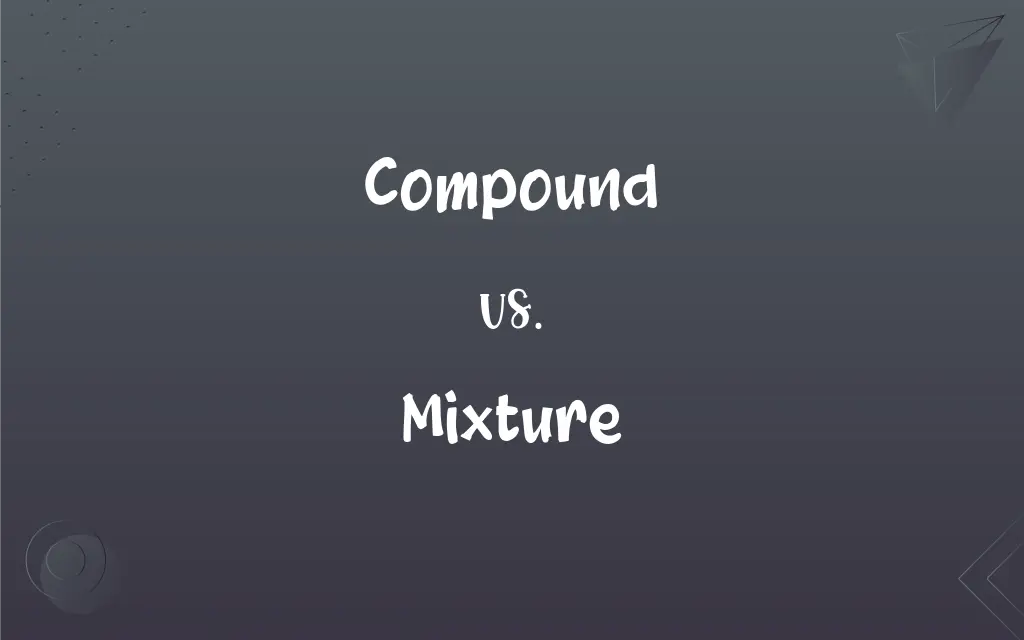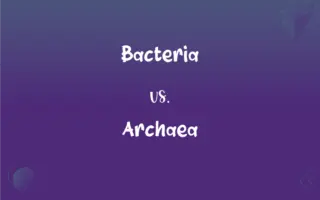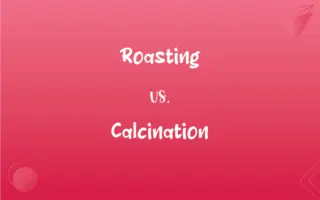Compound vs. Mixture: What's the Difference?
Edited by Janet White || By Harlon Moss || Updated on October 16, 2023
A "compound" is a substance formed when two or more elements chemically bond, while a "mixture" contains multiple substances physically combined, maintaining their properties.

Key Differences
In the realm of chemistry, both "compound" and "mixture" refer to the combination of elements, but they diverge in their essence. A "compound" is when two or more elements come together through a chemical bond, resulting in a substance with new properties. Conversely, a "mixture" is a physical combination of two or more substances where each retains its original properties.
Delving into "compound", it's characterized by a fixed ratio of elements. This means that the constituent elements are present in a specific proportion, which remains constant. A "mixture", however, doesn't adhere to a fixed ratio, allowing the constituents to be present in any proportion.
The formation and decomposition processes also draw a line between "compound" and "mixture". Creating a "compound" involves a chemical reaction, leading to energy changes and the creation of a new substance. However, forming a "mixture" doesn't entail a chemical reaction. Similarly, while separating the elements in a "compound" requires a chemical reaction, the components of a "mixture" can be segregated through physical means.
Another pivotal distinction is property retention. In a "compound", the original properties of constituent elements are lost once they bond. For instance, sodium and chlorine are reactive and harmful, but when they form the compound sodium chloride, they produce table salt, a stable and safe substance. Conversely, in a "mixture", no new properties emerge, and all substances retain their individual characteristics.
Lastly, the granularity of visualization distinguishes them. For a "compound", the combination occurs on a molecular or atomic level. But for a "mixture", the substances can often be visibly discerned, depending on the type of mixture and its constituents.
ADVERTISEMENT
Comparison Chart
Definition
Substance formed by the chemical combination of two or more elements.
Physical combination of two or more substances.
Ratio of Elements
Fixed ratio.
Variable ratio.
Formation/Decomposition
Involves chemical reactions.
Doesn't involve chemical reactions.
Property Retention
Original properties of elements are lost.
Substances retain their original properties.
Level of Combination
Molecular or atomic level.
Can be visible or invisible, depending on the type.
ADVERTISEMENT
Compound and Mixture Definitions
Compound
A blend or mixture.
The sauce was a compound of various spices.
Mixture
A substance made by physically combining different ingredients.
He made a mixture of lemonade and tea.
Compound
To settle a debt or matter by mutual agreement.
They chose to compound the dispute for a smaller amount.
Mixture
A variety of different things or people.
The audience was a mixture of young and old.
Compound
To increase or add to.
He compounded the problem by not seeking help.
Mixture
An organ stop that produces more than one pitch.
He used the mixture stop for a brighter sound.
Compound
A substance formed by the chemical union of two or more elements.
Water is a compound composed of hydrogen and oxygen.
Mixture
A combination of qualities or elements.
Her personality was a mixture of confidence and humility.
Compound
An enclosure with a building or group of buildings.
The embassy had a secure compound.
Mixture
A medicinal substance made up of several ingredients.
The pharmacist prepared a cough mixture for the patient.
Compound
To combine so as to form a whole; mix
Tin was often compounded with lead to make pewter.
Mixture
The act or process of mixing
An alloy made from the mixture of two metals.
Compound
To produce or create by combining two or more ingredients or parts; compose or make up
Pharmacists compounding prescriptions.
Mixture
The condition of being mixed
The inevitable mixture of different cultures in big cities.
FAQs
Is a "compound" always homogeneous?
Yes, a "compound" is always homogeneous because of the fixed ratio of its constituent elements.
How is the ratio of elements in a "compound" determined?
The ratio in a "compound" is determined by the valency and combining capacity of the constituent elements.
Do the properties of elements change in a "compound"?
Yes, in a "compound", the original properties of the elements change, giving rise to new properties.
Is air a "compound" or a "mixture"?
Air is a "mixture" of various gases like nitrogen, oxygen, and carbon dioxide.
Can a "mixture" be separated easily?
Components of a "mixture" can be separated through physical methods like filtration or distillation.
What's an example of a "compound"?
Water (H2O) is an example of a "compound".
Can a "mixture" have varying compositions?
Yes, the composition of a "mixture" can vary since it doesn't have a fixed ratio.
Do "compounds" have a definite melting and boiling point?
Yes, "compounds" have definite melting and boiling points.
What tools can be used to separate a "mixture"?
Tools like a sieve, magnet, or methods like distillation can be used to separate "mixtures".
What's the difference in energy change between "compound" and "mixture" formation?
"Compound" formation involves energy changes due to chemical reactions, while "mixture" formation generally doesn't.
Are chemical bonds formed in a "mixture"?
No, in a "mixture", the substances combine physically without forming chemical bonds.
How is a "compound" named?
A "compound" is named based on the elements present and follows the rules of chemical nomenclature.
Can compounds exhibit isomerism?
Yes, "compounds" with the same molecular formula but different structures can exhibit isomerism.
Why is understanding "compounds" vital in chemistry?
Understanding "compounds" is crucial as they form the basis for various chemical reactions and processes.
Can the constituents of a "mixture" be seen?
Depending on the type, the constituents of a "mixture" can sometimes be visibly discerned.
Is the weight of a "compound" the sum of its elements' weights?
Yes, the weight of a "compound" is the sum of the atomic weights of its constituent elements.
Is the chemical formula of a "compound" constant?
Yes, the chemical formula of a "compound" is constant and represents its composition.
How is a "mixture" different from a solution?
A solution is a homogeneous "mixture" where one substance dissolves in another.
Can a "mixture" be heterogeneous?
Yes, mixtures can be homogeneous (like a solution) or heterogeneous (like a salad).
Can a "mixture" be made of compounds?
Yes, a "mixture" can be composed of multiple compounds, elements, or both.
About Author
Written by
Harlon MossHarlon is a seasoned quality moderator and accomplished content writer for Difference Wiki. An alumnus of the prestigious University of California, he earned his degree in Computer Science. Leveraging his academic background, Harlon brings a meticulous and informed perspective to his work, ensuring content accuracy and excellence.
Edited by
Janet WhiteJanet White has been an esteemed writer and blogger for Difference Wiki. Holding a Master's degree in Science and Medical Journalism from the prestigious Boston University, she has consistently demonstrated her expertise and passion for her field. When she's not immersed in her work, Janet relishes her time exercising, delving into a good book, and cherishing moments with friends and family.































































